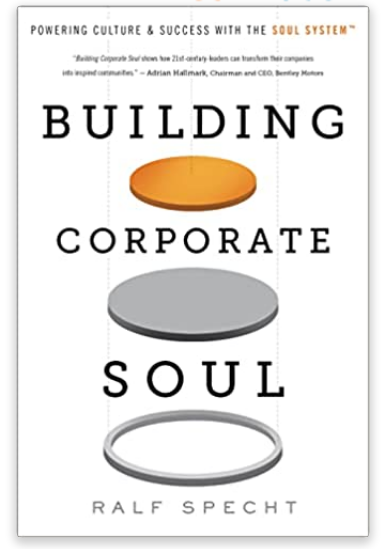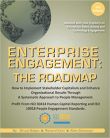Global Agency Founder to Help Companies "Build Corporate Soul"
Ralf Specht, founding partner of Spark44, an international ad agency he helped grow into a $100 million plus company with 1,200 employees, now turns his attention to promote “a framework that aligns value-creating employee action with broader corporate strategy through shared understanding and shared purpose.”

To regular readers of ESM, the theme of Building Corporate Soul: Powering Culture and Success with the Soul System™ sounds familiar. Corporate soul, the author Ralf Specht writes, “is a function of aligning value-creating employee behaviors with corporate strategy through understanding and shared purpose.”
Specht says he knows that many books already focus on values and principles. His book, he says, is designed to provide “a strong outline for implementation.” In 12 chapters, he provides a step-by-step implementation process CEOs and business leaders can use based on his own management experience and research on other companies.
To support the return-on-investment of “soul,” he created a Soul Index “comprised of companies that have a shared understanding of vision, mission, values and spirit, and corresponding shared behaviors of leadership, ecosystem drivers, compensation, recruitment, development, partnerships, and followers centered on shared purpose.” The companies selected, ranging from Adobe, Salesforce, Microsoft, and Amazon, to Workday, Hilton, Apple, SAP and American Express, significantly outperformed all the major stock indices from 2016 to 2021, the five years he tracked.
The book defines the concept of the corporate soul. It provides a description of the author’s soul system; outlines the role of purpose; discusses how to understand the soul of your company; lead with soul; nurture the soul ecosystem; promote its drivers, reward soul supporters; hire for soul; develop soul leaders, allies, and followers, and concludes with some of the author’s personal reflections.
ESM: This all makes sense. Why isn’t it being done now?
RS. It is being done. But it is not being done by the majority of businesses. Everybody in the world by now has understood what exponential growth is. That is what I see is happening at this moment. There is a fast-growing dynamic in place; companies the world over do realize that they have to do things differently.
The book includes the Soul Index, a performance ranking that is predominantly based on employee data about satisfaction and engagement at work as well as CEO approval data combined with business and brand success data. The results speak volumes. Companies that rank in the top 20 are delivering better returns than their peers. Happier employees drive better products and services as well as more satisfied customers. It´s an equation that gets more and more acceptance. Recent data by JUST Capital in the US are confirming the trend. Soul Index winner Adobe is also the number one on Benefits & Work-Life Balance as well as Diversity, Equity, & Inclusion.
The focus on corporate culture is growing and the recent moves from the Securities & Exchange Commission (SEC) will drive listed companies to consider the implications of any actions on their workforce more than ever before. There will be a better world – hence my vision is to make soulless companies a thing of the past.
ESM: Who is going to lead the way to making this happen? What role do you wish to play and how?
RS: Change is coming from many different players. There are the government bodies like the SEC that could have a huge impact if they finally commit to it. The power of employees should not be underestimated. The ´Great Resignation´ or ´Great Reshuffle´ as it is more rightfully named is actually nothing but a movement – although it is not organized like a movement but by millions of individual decisions – of workers who vote with their feet as a consequence of feeling undervalued by their companies or managers. They do not feel any sense of belonging to their company. Those businesses that do not have corporate soul – and their leaders are realizing that they need to act. Otherwise, there won´t be a company in the future.
I do much more believe in the concept of ´carrot´ rather than ´stick´. The carrot for any CEO is that a company of which the employees say ´our firm has got soul´ tastes so good because it means it is a highly successful company. Look at prime examples like Microsoft and Salesforce – you can see that the leadership has fully understood why it is critical and what needs to be done to make it tangible for all stakeholders.
My book is a reach for a book. It is written by a global business leader informed by the latest studies from academia and consultancies – it brings together practitioner realism with the theoretic wisdom. It is the basis for my engagement in this space in consulting companies and organizations to fully understand that thriving cultures, cultures with soul, are more successful than others. One of the options I am currently looking into is to open a Leadership Academy that focuses on implementing successful human-centric corporate cultures.
ESM. You come from the advertising business, and yet you barely mention the field. What role do you think advertising/marketing play in the current state of affairs, and what can or should advertising do about it?
RS. True. Because ´Corporate Soul´ is not an advertising or marketing idea. I spent more than two decades with McCann – their mantra has always been ´Truth Well Told´. Today, this is more relevant than ever. But too often, ´brand purpose´ has become a fig leaf concept for CMO´s (chief marketing officers) and their agencies to market products or services. But ´purpose´ is not a marketing concept.
´Purpose´ is at the core of how to lead a company. It is the key to align corporate strategy and corporate behaviors with that ´purpose´. Hence the Soul System framework defines it as ´shared purpose´. Shared by the entire board and shared with all stakeholders, especially staff. That is the critical first step. Then all corporate functions get involved – marketing being one of them and then agencies come into play.
Agencies need to ask the ´Truth Well Told´ questions:
• Is your purpose just an answer that sounds good to the questions consumers have?
• Is it a truth that is grounded in the very essence and reality of the company that is bringing this brand to market?
• Is it real or is it just wishful thinking?
If it is not real, they need to advise their clients on the risk that they are about to enter for their firm. As we all know, it takes a lot of time to earn trust and build a sound reputation. But you can destroy it faster than you think. But agencies are not the ultimate decision makers. CMOs have a real responsibility here – and given their often short-lived tenure these days, one can see the pressures that they are dealing with.
ESM. Your book makes no mention of human capital reporting or the greater ESG or Stakeholder Capitalism movement.
RS. When I wrote the book, it has been my intention to celebrate companies that have built corporate soul. Real-life cases of established firms like Lego, Hilton Hotels or Bentley Motors that have returned to the foundations of their founders’ beliefs on why the firm had been in business in the first place. Or start-up companies that are characterized by the innate energy, drive and focus of their founders to design a company that is better than any competitor in the field.
It´s my belief that learning from great and successful examples is the most infectious way to support the (Stakeholder Capitalism) movement. In my view, we need to make the leadership behaviors which build soul synonymous with the behaviors which build success. If we are successful in doing so, then the movements will all benefit. The value proposition is about success, because that is a language leaders understand. But the language of success needs to evolve and corporate soul needs to become the new language of success.
ESM: Do you think companies with corporate soul should publish human capital and sustainability reports to demonstrate this commitment?
RS. Absolutely. But there needs to be a clear framework for these – similar to accounting standards. We need human capital standards so that is easier for all stakeholders to compare sectors and companies. In the future, I am expecting that investor roadshows will no longer be a CEO and CFO show. We will see the Chief Talent Officer playing a key role at an equal level. Something we are not seeing in many companies at this day and age. But this will change as the largest stakeholder groups such as customers and employees will increasingly want to see the real facts when it comes how a corporation deals with its human capital.
“Our people are our biggest asset.” How often have we heard that statement since former Xerox CEO Anne M. Mulcahy spoke these words at the 2003 Life Management Conference? The time has come to make this not just nice words, but a reality.
About the Author
Ralf Specht is the author of “Building Corporate Soul”. He developed the Soul System™, a framework designed to power culture and success for any business.
After two decades with McCann Erickson in various executive roles, he was a founding partner of Spark44, an innovative, industry-first joint venture with Jaguar Land Rover. Under his leadership as CEO, Spark44 grew to a 1,200 people business in 18 countries. He is the author of Building Corporate Soul: Powering Culture & Success with the Soul System™ from Fast Company Press.
Click here to get ESM news delivered each week.
Master the “S” of Environmental, Social, Governance (ESG), A.k.a. Stakeholder Capitalism
The Enterprise Engagement Alliance at TheEEA.org is the world’s first and only organization that focuses on outreach, certification and training, and advisory services to help organizations achieve their goals by fostering the proactive involvement of all stakeholders. This includes customers, employees, distribution and supply chain partners, and communities, or anyone connected to an organization’s success.
Training and Thought Leadership
- Founded in 2008, the Enterprise Engagement Alliance provides outreach, learning and certification in Enterprise Engagement, an implementation process for the “S” or Social of Stakeholder Capitalism and Human Capital Management and measurement of engagement across the organization.
- The Enterprise Engagement Alliance provides a training and certification program for business leaders, practitioners, and solution providers, as well as executive briefings and human capital gap analyses for senior leaders.
- The EEA produces an education program for CFOs for the CFO.University training program on Human Capital Management.
- Join the EEA to become a leader in the implementation of the “S” of ESG and Stakeholder Capitalism.
- The ESM information portal and The Enterprise Engagement Advisors Network solution provider marketplace cover all aspects of stakeholder engagement, and the EEA information library lists dozens of resources.
- The RRN information portal and Brand Media Coalition marketplace address the use of brands for gifting, incentives, recognition, and promotions. The BMC information library provides information and research resources.
Video Learning
The EEA Human Capital Management and ROI of Engagement YouTube channel features a growing library of 30- to 60-minute panel discussions with leading experts in all areas of engagement and total rewards.
- Enterprise Engagement for CEOs: The Little Blue Book for People-Centric Capitalists. A quick guide for CEOs.
- Enterprise Engagement: The Roadmap 5th Edition implementation guide. A comprehensive textbook for practitioners, academics, and students.
Enterprise Engagement Advisory Services
The Engagement Agency helps:
- Organizations of all types develop strategic Stakeholder Capitalism and Enterprise Engagement processes and human capital management and reporting strategies; conduct human capital gap analyses; design and implement strategic human capital management and reporting plans that address DEI (Diversity, Equity, and Inclusion), and assist with managed outsourcing of engagement products and services.
- Human resources, sales and marketing solution providers profit from the emerging discipline of human capital management and ROI of engagement through training and marketing services.
- Investors make sense of human capital reporting by public companies.
- Buyers and sellers of companies in the engagement space or business owners or buyers who seek to account for human capital in their mergers and acquistions.
For more information: Contact Bruce Bolger at Bolger@TheICEE.org or call 914-591-7600, ext. 230.
















